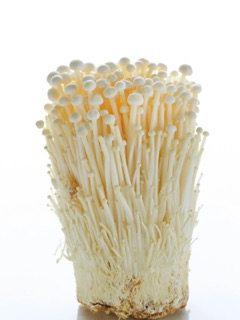

Enoki mushrooms, also known as Enokitake or Golden needle mushrooms, are safe for dogs to eat and offer a range of health benefits. They are rich in nutrients that help enhance immunity, promote a healthy heart and brain, and may contain cancer-fighting properties.
Enoki mushrooms are a nutritious addition to a dog’s diet, as they are rich in thiamine, riboflavin, pantothenic acid, and vitamin B6. They are also a good source of minerals such as selenium, phosphorus, copper, and potassium. Additionally, enoki mushrooms contain anti-cancer and anti-inflammatory properties.
While cultivated enoki mushrooms are generally safe for dogs, some dogs may find raw enoki mushrooms difficult to digest and may experience diarrhea after consuming them.
To make enoki mushrooms easier to digest, it is recommended to cut off the woody “stem” parts. Fresh enoki mushrooms should be rinsed and soaked to remove impurities before being drained and chopped into smaller pieces for cooking. Dried enoki mushrooms should be soaked for 30 minutes to an hour, rinsed under running water, and chopped into small pieces. Enoki mushrooms should be served in moderation as an occasional treat for dogs.
Enoki mushrooms, also known as Enokitake or Golden needle mushrooms, are a variety of mushroom that is safe for dogs to consume. These mushrooms have their origins from East Asia and are commonly found in Japanese and Korean cuisine. Enoki mushrooms are known for their rich nutrient content such as vitamins B6, thiamine, pantothenic acid, and riboflavin, along with minerals such as copper, phosphorus, potassium, and selenium. They are believed to offer numerous health benefits, including enhanced immunity and anti-cancer properties.
While enoki mushrooms are generally safe for your furry friend to consume, some dogs might have trouble digesting raw enoki. This may result in diarrhea, so it's important to note that such symptoms can occur. If serving enoki to your dog, make sure to remove the woody parts, clean them, and chop them into smaller pieces. Fresh enoki mushrooms are preferred, but dried ones can be soaked in water prior to cooking. It's best to serve enoki mushrooms to dogs moderately as an occasional treat.
Enoki mushrooms are relatively affordable and can be easily found in most supermarkets. As for serving suggestions, these mushrooms can be used in many dishes, such as soups, salads, and stir-fries. However, make sure you only serve them as an occasional treat to your pooch.
If you're looking for alternatives to enoki mushrooms, other safe mushroom options are shiitake mushrooms and portobello mushrooms. However, it is important to do your research and make sure the mushroom you're feeding your dog is safe for them to consume.
Have you ever fed your furry friend enoki mushrooms? If so, what was their experience? Let's talk about it! Remember, always consult your vet before making any dietary changes to your dog's diet. As always, give your furry pal a good scratch behind the ears and a happy woof from me!